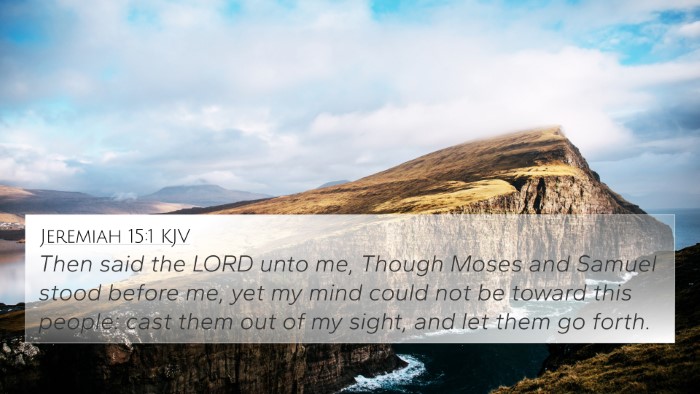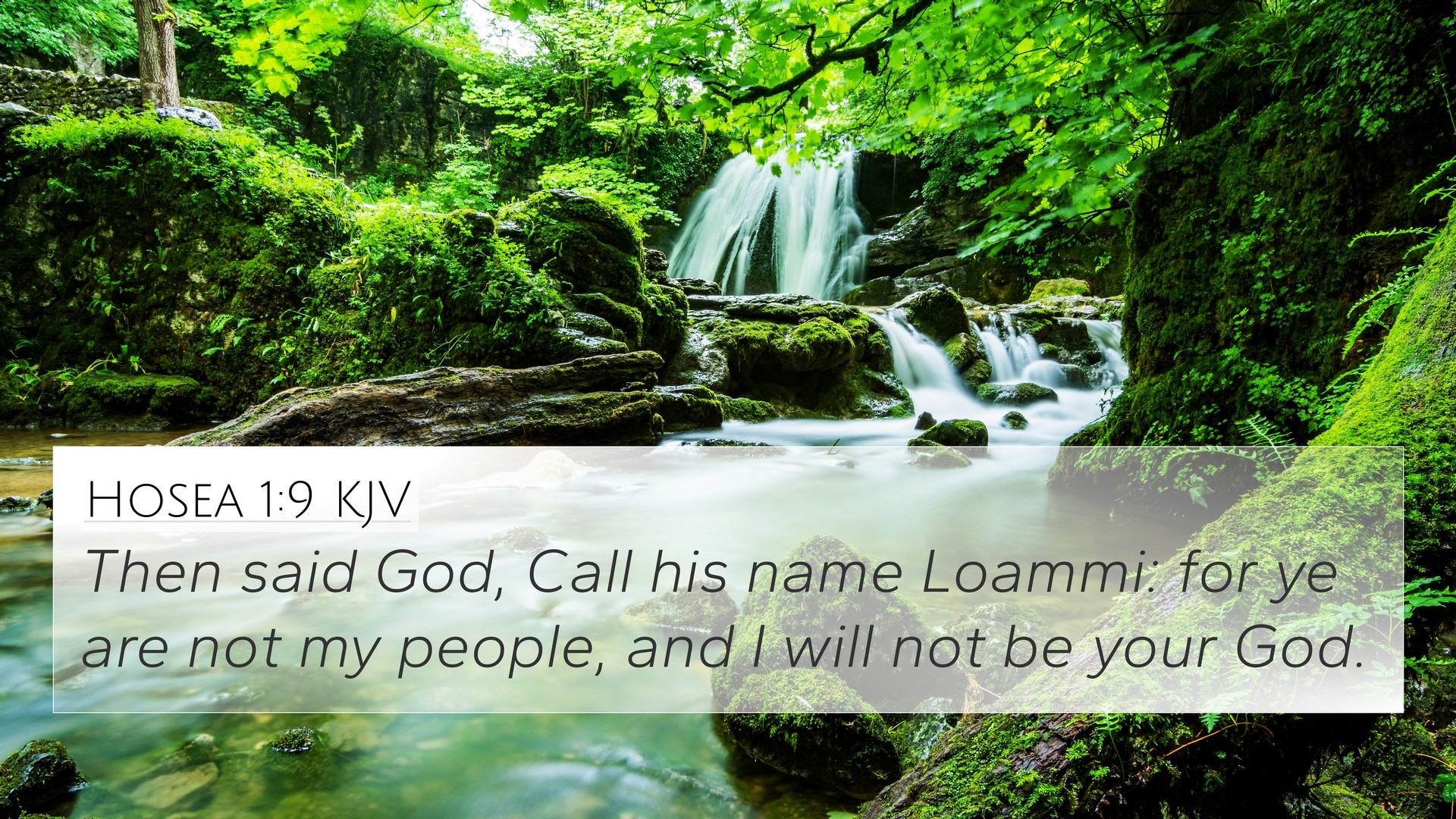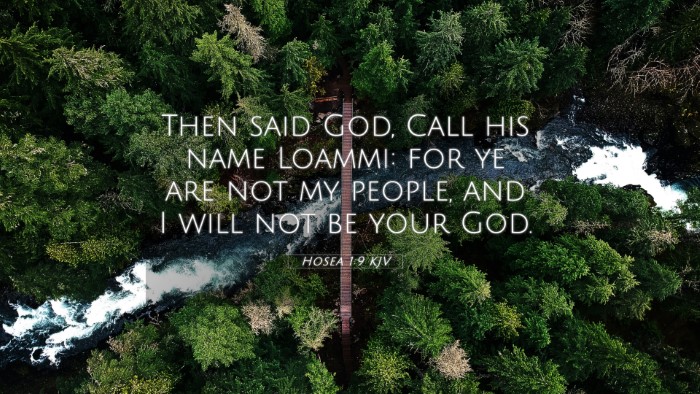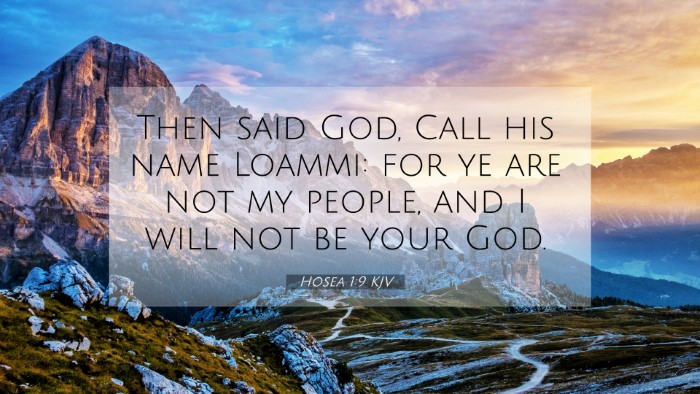Old Testament
Genesis Exodus Leviticus Numbers Deuteronomy Joshua Judges Ruth 1 Samuel 2 Samuel 1 Kings 2 Kings 1 Chronicles 2 Chronicles Ezra Nehemiah Esther Job Psalms Proverbs Ecclesiastes Song of Solomon Isaiah Jeremiah Lamentations Ezekiel Daniel Hosea Joel Amos Obadiah Jonah Micah Nahum Habakkuk Zephaniah Haggai Zechariah MalachiHosea 1:9 Similar Verses
Hosea 1:9 Cross References
Then said God, Call his name Loammi: for ye are not my people, and I will not be your God.
Uncover the Rich Themes and Topics of This Bible Verse
Listed below are the Bible themes associated with Hosea 1:9. We invite you to explore each theme to gain deeper insights into the Scriptures.
Hosea 1:9 Cross Reference Verses
This section features a detailed cross-reference designed to enrich your understanding of the Scriptures. Below, you will find carefully selected verses that echo the themes and teachings related to Hosea 1:9 KJV. Click on any image to explore detailed analyses of related Bible verses and uncover deeper theological insights.

Jeremiah 15:1 (KJV) »
Then said the LORD unto me, Though Moses and Samuel stood before me, yet my mind could not be toward this people: cast them out of my sight, and let them go forth.
Hosea 1:9 Verse Analysis and Similar Verses
Understanding Hosea 1:9
Verse: "Then said God, Call his name Loammi: for ye are not my people, and I will not be your God." (Hosea 1:9)
This verse from the book of Hosea is significant in the context of God's relationship with Israel. It underscores the theme of judgment and the consequences of the nation's unfaithfulness to God. Hosea, a prophet in the Northern Kingdom of Israel, used powerful imagery and personal experience to convey God's messages.
Context and Background
Hosea was commanded by God to marry a woman he knew would be unfaithful, symbolizing Israel's betrayal of their covenant with God. The naming of his children served as prophetic signs. In Hosea 1:9, "Loammi" translates to "Not My People," starkly illustrating the break in the relationship between God and Israel.
Key Themes
- Divine Judgment: The declaration that Israel is "not My people" reflects severe judgment due to their idolatry and sin.
- Separation: This verse signifies a critical separation between God and His chosen people—a recurring theme in prophetic literature.
- Hope for Restoration: Despite the bleak declaration, the larger narrative in Hosea moves towards eventual restoration and reconciliation.
Commentary Insights
According to Matthew Henry, "Loammi" symbolizes a complete rejection of Israel at that moment, emphasizing the seriousness of the consequences of their actions. The phrase, "I will not be your God," speaks to the profound loss of divine favor and protection that ensued from their infidelity.
Adam Clarke highlights that God's pronouncement was not without hope; it was meant to bring Israel to a place of recognition of their sin, ultimately leading them to repentance and restoration.
Albert Barnes reflects on the broader implications of this statement, suggesting that it signifies a temporary state of estrangement rather than an eternal abandonment, hinting at the possibility of future reconciliation.
Cross-References
This verse connects with several other biblical texts that reinforce the themes of judgment, separation, and eventual restoration:
- Jeremiah 31:1: "At the same time, saith the Lord, will I be the God of all the families of Israel, and they shall be my people." - A promise of future restoration.
- Romans 9:25-26: "As he saith also in Osee, I will call them my people, which were not my people; and her beloved, which was not beloved." - Echoing the themes from Hosea about belonging.
- 1 Peter 2:10: "Which in time past were not a people, but are now the people of God..." - Affirming God's inclusive plans for all who believe.
- Isaiah 54:7-8: "For a small moment have I forsaken thee; but with great mercies will I gather thee." - God’s assurance of mercy post-judgment.
- Ezekiel 37:23: "And they shall no more be divided into two nations; neither shall they be divided into two kingdoms any more at all." - Unity and restoration of Israel.
- Hosea 2:23: "And I will sow her unto me in the earth; and I will have mercy upon her that had not obtained mercy." - Continuation of God’s promise to redeem His people.
- Revelation 21:3: "And I heard a great voice out of heaven saying, Behold, the tabernacle of God is with men, and he will dwell with them, and they shall be his people..." - The ultimate fulfillment of God's promise for His people.
Practical Applications
Understanding Hosea 1:9 can prompt reflection on the importance of loyalty and fidelity in our own relationships with God. Here are some applications:
- Examine Our Faithfulness: Just as Israel was called to account for their unfaithfulness, we should take stock of our own spiritual lives and relationships.
- Recognize the Consequences of Sin: This passage serves as a reminder that straying away from God leads to separation and consequences.
- Hope in Restoration: Even in judgment, God offers hope and the possibility of reconciliation for those who turn back to Him.
Thematic Connections
This scripture invites connections with other verses that discuss themes of divine love and judgment, underscoring the tension between God's holiness and His desire for relationship with humanity. Notably, the interplay between the Old and New Testament showcases the continuity of God's redemptive narrative.
Utilizing tools for Bible cross-referencing such as a Bible concordance or Bible cross-reference guide can aid in exploring deeper thematic connections across scriptures, enhancing your understanding of biblical narrative and theology.
Conclusion
In summary, Hosea 1:9 serves as a powerful reminder of the ramifications of unfaithfulness and the overarching theme of hope in God's plan for restoration. Through cross-referencing Bible texts and understanding the intricate connections between biblical passages, we gain insight into the profound depths of God's character and His desire for a faithful relationship with His people.


